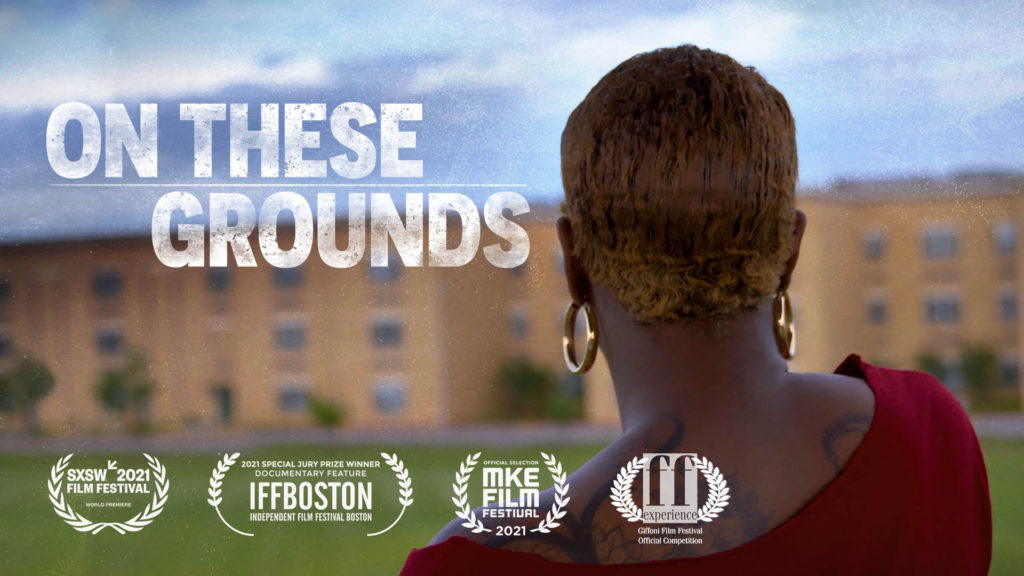
Black Girls Deserve Safety and Compassion, Not Criminalization
By Loryn Wilson Carter
Cover Photo Credit: Journeyman Pictures
On October 26, 2015, Shakara was a 16-year-old student at Spring Valley High near Columbia, South Carolina. When she refused to put her cell phone away, her teacher called the campus resource officer, who then flipped Shakara’s desk over, flinging her out of her seat and across the classroom floor. Her fellow students looked on in horror, with one student, another Black girl, Niya Kenny, raising her voice to tell the officer that Shakara didn’t do anything to deserve being assaulted, asking why they were treating her this way. As a result, Niya was arrested and charged with “disturbing school” while, the police officer was never charged.
Since then, a documentary about the incident entitled On These Grounds has been released to tell Shakara’s story and advocate for better treatment of Black girls on school campuses. Additionally, the organization Every Black Girl was formed in light of Shakara’s assault to ensure that what happened that day at Spring Valley does not happen again. Shakara and her classmate Niya have also gone on to become advocates in their own right through their work with the In Our Names Network.
Since 2015, the safety and security of Black girls on school campuses remain in jeopardy. In 2012 alone, Black girls were suspended six times more than white girls in public schools across the country, according to a report from the African American Policy Forum. Additionally, girls and non-binary youth who are suspended face a significantly greater likelihood of pushout, where youth are pushed out of the school system. As a result, Black girls and non-binary youth are more likely to have contact with the juvenile justice system. As Monique Morris points out in her book Pushout, people often read the statistics on school suspensions and pushout and ask, “What did these girls do?” instead of interrogating the culture of discipline and punishment that leaves little room for error when it comes to Black girls.
One study revealed that teachers sometimes exercised disciplinary measures against Black girls to encourage them to adopt more “acceptable” qualities of femininity, such as being quieter and more passive–which resonates with me as someone who was often told I should talk less and not be so “aggressive” or “outspoken.” Monique Morris also points out that Black girls are often painted as defiant or disruptive when they ask questions or do anything that seems to challenge authority. Relatedly, Black girls are policed for things that have nothing to do with behavior or learning, such as hair and clothes. In 2018, an 11-year-old girl was suspended from her private school for wearing hair extensions.
Criminalizing and policing Black girls in school doesn’t just create an unsafe and hostile environment for students, but it also hinders learning and keeps school campuses from being a positive place where Black girls can grow and thrive academically and socially. Oftentimes, Black youth may have behavioral issues because they are not being taught in a way that is in alignment with how they best learn.
A pop-culture example of this is a recent episode of Abbott Elementary, where Janine and her colleagues are challenged by a disruptive student named Courtney. Instead of jumping to detention, expulsion, or sending her to the principal’s office, Janine and Melissa realize that perhaps Courtney is acting out because she isn’t being challenged academically. By the end of the episode, they agree that the best plan of action is to advance Courtney to the next grade level, successfully addressing her boredom and putting an end to her disruptive behavior.
Imagine if more schools took the approach of the teachers on Abbott Elementary: intentionally exploring what Black girls need to grow and learn, rather than the girls themselves being treated like a problem that must be fixed. Black girls deserve to attend schools where they are not targeted as criminals and are not treated as pariahs if they wear their hair in braids or dreadlocks. They deserve teachers that play to their many strengths and talents rather than punish them when it is the teachers’ responsibility to figure out how Black girls learn best.
The solutions to ending the criminalization of Black girls are simple: listen to Black girls, ask hard questions about how they best learn and treat them like human beings whose lives matter. The Black Girls Bill of Rights compiled by Girls for Gender Equity gives great insight into what it takes for creating a safer world for Black girls and non-binary youth, including “The right to BE—exactly who she is, free from stereotypes and insecurity, her full unique self.” The National Agenda for Black Girls was formed in 2020 to advocate for passing the Black Girls Bill of Rights and for more advancements toward education justice, among other priorities. Treating Black girls with compassion is a key step to ensuring that they can thrive academically and a safe, positive environment can be formed within the school walls.
